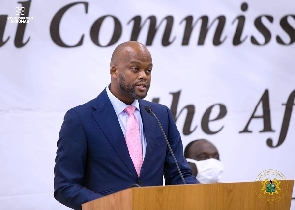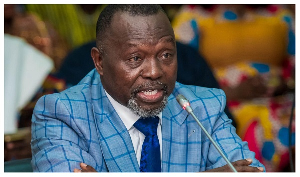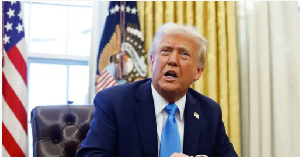Secretary-General of the African Continental Free Trade Area (AfCFTA), Wamkele Mene, has emphasised the transformative potential of the AfCFTA in driving Africa’s economic development.
According to him, the AfCFTA, complemented by the African Union (AU) Protocol on free movement of persons, is breaking down barriers to trade and fostering cross-border collaboration.
In a speech read on his behalf at the opening of a capacity-building workshop organised by the Africa Capacity Building Foundation (ACBF), he underscored the significant strides made towards the integration and liberalisation of Africa’s service and creative industries.
The two-day workshop, organised in support of the implementation of the AfCFTA, brought together participants from African countries including the Democratic Republic of Congo, Togo, Ghana, Uganda, Malawi, Burkina Faso, Cameroon, and Côte d’Ivoire, among others.
Mr. Mene explained that the AfCFTA framework enhances market access and investment while addressing skills gaps and labour market mismatches across the continent.
“By enabling the seamless movement of professionals and service providers, we are ensuring businesses can access the talent they need to drive productivity and growth,” he said.
He noted that progress under the AfCFTA is evident, with 48 member states submitting initial offers across priority sectors, including financial services, communications, transport, tourism, and business services.
Of these, 22 draft schedules of specific commitments have been adopted for provisional implementation, signalling a major step toward unlocking Africa’s service potential.
Mr. Mene also reiterated the importance of embracing digital innovation and harmonising trade frameworks to ensure inclusive and sustainable development.
He praised initiatives like the workshop, describing them as critical for empowering stakeholders to actively shape Africa’s economic future.
“The success of this ambitious project depends on collaboration, resilience, and innovation,” he said, adding that the AfCFTA Secretariat remains committed to supporting such initiatives to build capacity and promote Pan-African unity.
He encouraged participants to engage fully in the workshop, noting that their contributions would play a vital role in shaping intra-African trade.
Mr. Mene reaffirmed the AfCFTA’s mission to leverage Africa’s diversity as a force for unity and prosperity.
Dr. Mbacke Niang, Director of Programme and Impact at ACBF, emphasised the need for African member countries to enhance the domestication of trade agreements to ensure effective implementation.
He stressed the significance of such engagements in fostering economic integration across the continent.
Dr. Niang also announced plans to organise more training and awareness workshops in 2025 across key Regional Economic Communities in Africa to deepen understanding and implementation of trade frameworks.
According to Dr. Niang, these initiatives will empower MSMEs to tap into opportunities created by trade agreements, contributing to a more robust and interconnected African economy.
He further urged participants to actively engage in workshop sessions, share insights, and explore potential partnerships beyond the event.
He underscored the collective responsibility of stakeholders in building a prosperous Africa and expressed optimism about the impactful outcomes of their collaboration.
Business News of Friday, 29 November 2024
Source: ghanaiantimes.com.gh













